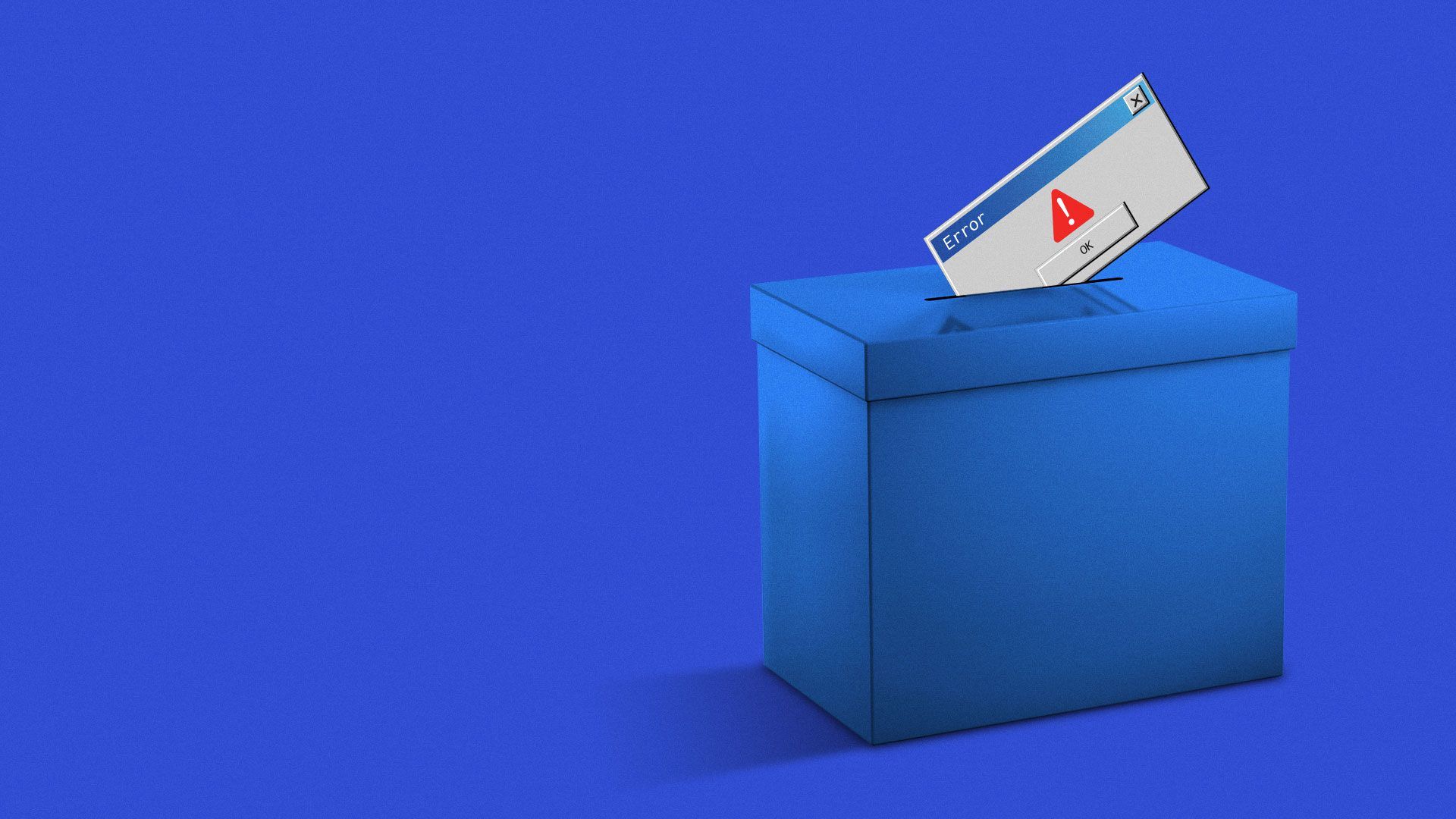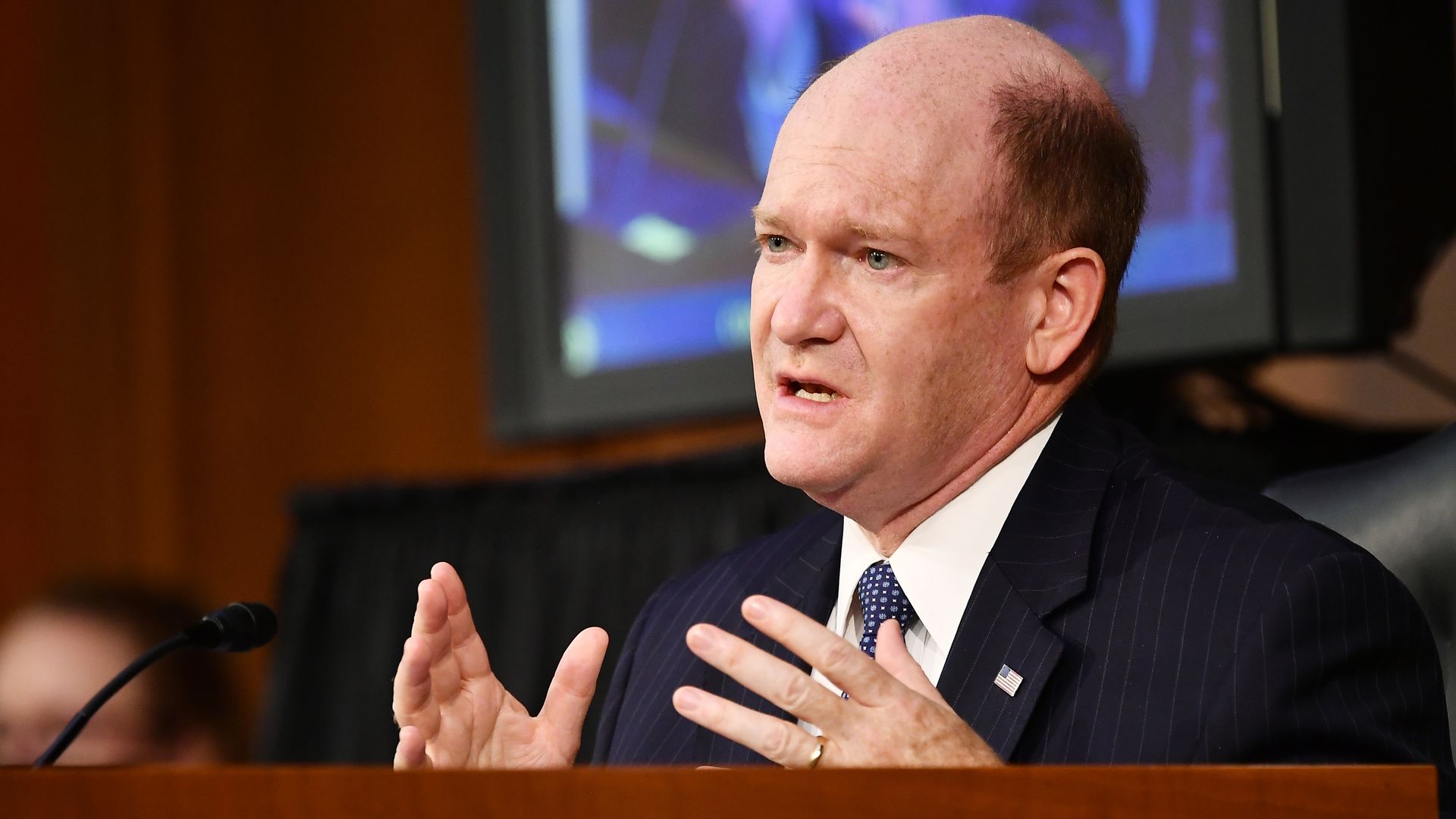| | | | | | | Presented By Bright Cellars | | | | Login | | By Ina Fried ·Nov 16, 2020 | | Join Axios on Tuesday, Nov. 17 at 12:30pm ET for "Hard Truths," the second event in a year-long series on systemic racism featuring National Education Association president Becky Pringle, Northern California Indian Development Council Indigenous education advocate Rain Marshall and EdBuild founder and CEO Rebecca Sibilia. Today's Login is 1,309 words, about a 5-minute read. | | | | | | 1 big thing: Tech's election post mortem |  | | | Illustration: Eniola Odetunde/Axios | | | | In assessing their performance during the recent election, the big tech companies all feel they did a much better job than in 2016 at deflecting foreign meddling and disinformation, Axios' Ashley Gold and Sara Fischer report. However, the platforms struggled with a fresh set of issues this year, as well as the challenge posed by President Trump's refusal to concede and unsubstantiated claims of fraud. Before and after Election Day, the platforms found themselves reacting, adapting and sometimes improvising new rules on the fly, despite their lengthy preparations. Facebook- Shortly after Election Day, Facebook announced new steps, including temporarily demoting election-related misinformation and limiting distribution on some election-related live streams.
- The company faced criticism for being slow to respond to groups and events that suggested the election was being "stolen" by Democrats through vote-by-mail fraud.
- Along with Google, Facebook confirmed last week that it would extend its political advertising ban to cover a longer post-election period, as the GOP challenges the results. That means these bans will remain in place as millions of dollars start flowing into two Georgia runoff elections that will determine which party controls the Senate.
Twitter- Twitter, the first online platform to ban political ads, was widely seen as taking the toughest measures against misinformation.
- The company said approximately 74% of people who viewed problematic tweets saw them after Twitter had applied a label or warning message.
- It estimated a 29% decrease in shares via quote tweets of these labeled posts.
YouTube- Google-owned YouTube allows "discussion of election results and the process of counting votes." Under that policy, the online video giant left up videos from news channels like OANN that have pushed false stories on election fraud and postal ballots.
- Yes, but: "The most popular videos about the election are from authoritative news organizations," said YouTube spokesperson Ivy Choi.
- According to Choi, when users search for election-related content, 88% of the videos shown in their top-10 results in the U.S. come from "authoritative sources."
Snapchat- Snapchat didn't need to make any adjustments to its political ad policies, because the company fact-checks all of its ads.
- Over 30 million Snapchat users used its voter engagement programs, which helped users register to vote or make a plan to vote, with over 1.2 million users registering to vote via these programs.
- Snapchat, by design, doesn't have the same type of public-facing viral news environment that Facebook and Twitter have, shielding it from some of its peers' woes.
TikTok The video-sharing platform has tried to remain apolitical, but it ended up struggling to contain election-related misinformation anyway. - Shortly after Election Day, TikTok took action against several election-related hashtags, like #RiggedElection, but left others up, TechCrunch reported. The platform also took down a number of popular videos touting unsupported election-fraud allegations after a report by Media Matters.
- TikTok didn't have election-related statistics to share, but spokesperson Jamie Favazza said TikTok would provide a recap of its election integrity efforts "in the future" and is still removing misleading information, videos and violence-inciting accounts.
LabelingThe platforms' chief remedy for unsupported claims of election fraud was to append posts with labels pointing to authoritative information. Yes, but: Misinformation experts say labeling policies did not deter people from sharing knowingly false information. - Platforms applied labels to false information, including from the president, but in many cases did not apply more "friction" to prevent sharing, meaning labeled content still spread wildly, said Alex Stamos, former Facebook CISO and head of the Stanford Internet Observatory.
- "The label isn't doing anything," Stamos said.
The bottom line: Under normal circumstances, election-related debate is an asset of democracy, and the last kind of content that a tech platform would block. The combination of a deeply polarized nation and a chief executive prone to tweeting falsehoods pushed these companies' systems beyond anything they were built for. - Ten days after the election, misleading or deceptive new narratives continue to bubble up online, according to experts from the Election Integrity Project: misleading charts and statistics about voting, anecdotes about dead voters, false storylines about voting machine "glitches" affecting election outcomes.
What's next: Twitter CEO Jack Dorsey and Facebook CEO Mark Zuckerberg will testify before the Senate Judiciary Committee on Tuesday. |     | | | | | | 2. Senators want Facebook to address anti-Muslim speech |  | | | Sen. Chris Coons (D-Del.) Photo: Mandel Ngan-Pool/Getty Images | | | | A group of Democratic senators says Facebook needs to better enforce its hate speech policies on anti-Muslim posts. The group, led by Sen. Chris Coons, plans to send a six-page letter to Facebook today expressing "deep concern" and asking the social network to commit to better auditing and internal monitoring of its practices. Why it matters: Facebook is under pressure from a range of groups and politicians on both the left and right who feel mistreated by the social network. Driving the news: The letter, seen by Axios, cites some progress from Facebook, including a recently completed civil rights audit, but notes that the company "has not yet publicly studied or acknowledged the particular ways anti-Muslim bigotry manifests on its platform." - The letter has more than a dozen signatories, including Coons, Richard Blumenthal, Dick Durbin, Mark Warner, Amy Klobuchar and Elizabeth Warren.
|     | | | | | | 3. Apple's Big Sur release causes headaches | | Mac owners ran into a variety of challenges Thursday as Apple rolled out Big Sur, the latest version of OS X. Many Mac users who weren't installing the operating system update also found their systems slowing down. Apple confirmed to Axios Sunday that the slowdown resulted from a cascade of problems stemming from checks against Apple servers that an app's developer certificate is still valid. Troubles included a server configuration issue and a problem with Apple's content delivery network. Why it matters: Privacy-conscious customers are often wary when systems "phone home," and Apple has extensively marketed its commitment to privacy as a fundamental right. The big picture: Apple posted additional information on its web site on Sunday to clarify the process it uses to verify that an app has not had its credentials revoked. - Some critics worried about the possibility Apple might be tracking which apps they were opening, but Apple noted that it never included a user's Apple ID or other identity information when making the query to Apple's servers.
- The company said that, "to further protect privacy," it has also stopped logging the IP addresses of computers making developer ID certificate checks and will remove any IP addresses it has collected from its logs.
What's next: Apple said it plans to introduce an encrypted protocol for such checks as well as a new preference allowing people to opt out of the security protection entirely. |     | | | | | | A message from Bright Cellars | | This wine is made for your palate | | |  | | | | Discover your wine experience with Bright Cellars – a monthly wine club that matches you with wine that you'll love. To get started, take their quiz and get matched with wine specifically for your taste. Order today and get $45 off your first box of 6 personalized bottles of wine and tasting cards. | | | | | | 4. Qualcomm can sell some chips to Huawei | | Qualcomm confirmed Saturday that it has received permission from the U.S. government to sell certain chips, including some 4G chips, to Huawei. Why it matters: The U.S. sanctions against Huawei have hurt that company's mobile phone business especially hard, but they have also taken a toll on Huawei's U.S. suppliers, including chipmakers and software providers. "We received a license for a number of products, which include some 4G products," Qualcomm said in a statement. The company declined to be more specific. Context: The U.S. government has applied a range of sanctions on Huawei over the past 18 months, prohibiting most American companies from doing business with the Chinese telecom supplier without special permission. - The Trump administration has also pressured U.S. allies to ban Huawei gear from their 5G networks and taken additional actions designed to make it harder for Huawei to get the parts it needs to make both smartphones and network gear.
Go deeper: |     | | | | | | 5. Take Note | | On Tap - The Senate hearing with Dorsey and Zuckerberg will take place via video conference Tuesday morning.
- The New York Times is holding its DealBook conference online Tuesday and Wednesday.
ICYMI - Most of Silicon Valley's blue-collar support staff — especially union workers — continue to be paid but uncertainty remains. (NBC News)
- The first benchmarks suggest the first Macs with Apple-designed M1 chips are outperforming Intel-based systems even when running code designed for Intel chips. (MacRumors)
- Billionaire conservative mega-donor Rebekah Mercer is among the backers of Parler, the social network making a play for disgruntled right-leaning Facebook and Twitter users. (Wall Street Journal)
- The Trump administration gave China's ByteDance more time to finalize its deal to divest TikTok. (New York Times)
|     | | | | | | 6. After you Login | | Check out Coca-Cola's 2020 holiday commercial. But be warned, it may eat into your Kleenex supply. |     | | | | | | A message from Bright Cellars | | This wine is made for your palate | | |  | | | | Discover your wine experience with Bright Cellars – a monthly wine club that matches you with wine that you'll love. To get started, take their quiz and get matched with wine specifically for your taste. Order today and get $45 off your first box of 6 personalized bottles of wine and tasting cards. | | | | | | Axios thanks our partners for supporting our newsletters.
Sponsorship has no influence on editorial content. Axios, 3100 Clarendon Blvd, Suite 1300, Arlington VA 22201 | | | You received this email because you signed up for newsletters from Axios.
Change your preferences or unsubscribe here. | | | Was this email forwarded to you?
Sign up now to get Axios in your inbox. | | | | Follow Axios on social media:    | | | | | |






No comments:
Post a Comment